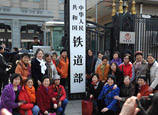
BEIJING, March 16 (Xinhua) -- Chinese soybean farmers have urged the government to come to their rescue as they are grappling with an influx of cheaper, genetically-modified (GM) soybeans from overseas.
They expressed worries that over-reliance on soybean imports -- as high as 80 percent -- could put the country's cooking oil and animal feed industries, which use soybeans as major material, in despair.
"The Chinese soybean industry suffering from shrinking planting areas is at the crossroads of life and death," said Sun Bin, a farmer from northeastern province of Heilongjiang.
China has become increasingly dependent on soybean imports and foreign capital is dominating the Chinese soybean market, said Sun, also one of nearly 3,000 lawmakers who are in Beijing for the annual session of the National People's Congress (NPC).
Heilongjiang accounts for about one-third of China's annual soybean output. The province's soybean planting area, however, slumped significantly from 4.7 million hectares in 2009 to 2.53 million hectares in 2012.
During the period, farmers in the province planted more corn, which has a higher yield and is more profitable.
"When farmers can earn 4,000 yuan (635 U.S. dollars) more from a hectare of corn than from soybeans, who is willing to plant soybeans?" said Qu Fa, another farmer from Heilongjiang.
Aggravating the woes of soybean farmers, soybean processing plants were reluctant to buy domestic soybeans.
At present, imported soybeans sell at 4,400 yuan per tonne, while domestic soybeans are priced at 4,600 yuan per tonne, said Wang Xiaoyu, deputy secretary-general of the Heilongjiang Soybean Association.
Soybean farmers in the province have been caught between the hammer and the anvil, Wang said.
FOREIGN HANDS
Cheap imported soybeans have led China to become a net importer of soybeans.
In the mid-1990s, China opened up its soybean market to import more soybeans to satisfy greater domestic demand for cooking oil.
In order to comply with World Trade Organization rules, China fully opened its soybean market in 2001. Soybeans from overseas flocked to the Chinese market and for the first time, soybean imports exceeded 20 million tonnes in 2003, surpassing domestic output. Since then, China's soybean imports have increased year after year.
China imported 58.38 million tonnes of GM soybeans last year, mostly from the United States, Brazil and Argentina, because the country produced about 14 million tonnes of soybeans while the demand exceeds 70 million tonnes annually.
Imports accounted for around 80 percent of the country's soybean consumption last year, said Hong Yuanshu, a member of the National Committee of the Chinese People's Political Consultative Conference (CPPCC), top political advisory body of China.
"Hitting the Chinese soybean market with low-priced GM soybeans is part of a strategy used by transnational grain businesses to monopolize the Chinese soybean industry," said Zhao Yusen, another member of the CPPCC National Committee.

















 Spring comes to China. More Spring Photos: 'Fresh style' ;'Spring Style'
Spring comes to China. More Spring Photos: 'Fresh style' ;'Spring Style'


![]()
